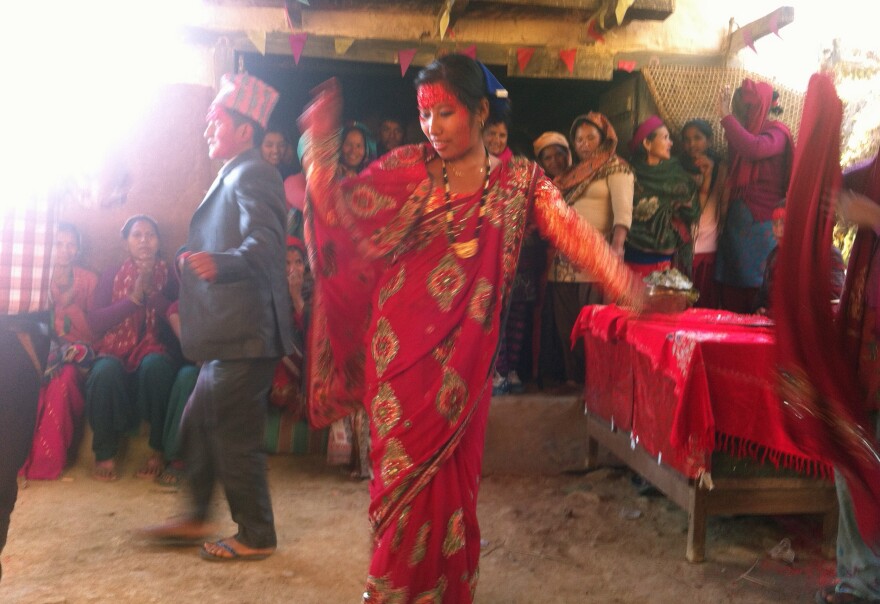Recently, for perhaps the first time in my life, I witnessed my father dance in public. Not only was this in public, but on live TV at a Nepali temple in the middle of festival season.
Keep in mind this is a man rarely seen dancing even in his own home, let alone in front of hundreds of strangers in a foreign country. Only four days into his trip to visit his daughter in the Peace Corps, he succumbed to the relentless powers of Nepali persuasion (and without a stiff drink, mind you).
The joy of dancing — and watching others dance — is a central Nepali pastime. Today Nepal is the second poorest country in Asia and over half of its people live on less than two dollars a day. But that doesn't stop them from having fun. For many, dancing is the surest, if not the only, form of entertainment around.
Peer pressure is integral to Nepali dance. There's even a word for this: nachaune, "to make dance." The formula goes like this: blast some music, take turns goading everyone around you into the center of the circle, then stand around clapping and hollering at the brave soul who takes the first plunge. It's an elaborate group flirtation. Coyly insist you can't, and then once you're begged, bust out all the moves.
No matter how much you might rather drop dead on the spot than dance in front of a huge crowd of people, it's useless to resist, especially if you're a foreigner. Where I live in southwestern Nepal, many people have never met or spoken to a foreigner, let alone seen one dance. So they can't resist egging me on.
Several times Nepalis have physically dragged me into a dance circle and moved my flaccid arms for me until I gave in. Location is hardly an obstacle — I've been asked to dance at meetings, while trekking, on stage, on a bus, and even once on an airplane. On a return flight, a Nepali tour group seated next to me discovered I spoke the language and it only took a few minutes for them to organize a volunteer to start singing so I could dance in the aisle. Mercifully, the flight attendant put an end to that.
My first few months living here I was angered by the forcefulness of it all. It was like being hazed. I imagined my Nepali friends pointing at me and shouting, "Dance, monkey dance!" until I did. And then eventually I realized that they were equally ruthless with each other and that it really was all part of the fun.
After a year and a half of living in Nepal, I now preempt a protracted struggle and actively throw myself into the dance circle at the earliest opportunity. It may be part narcissism (who doesn't want to be the belle of the ball?) but it's equal parts joy and careless abandon. In the Nepali dancing game, enthusiasm compensates for lack of skill. And since everyone stares at the foreigner anyway, I might as well dance.
Fortunately, even if I'm low on energy or the music is lackluster, basic Nepali dancing is comprised of about four distinct moves. They are something akin to a blissed-out hippie dance, a whirling dervish-like twirl, a flirtatious hula sway, and on the less inspired end of things, jazz hands and a hip bump.
Almost any big event in Nepal has a dance circle so I've had plenty of chances to refine my moves. Much of my practice comes from living with my host family, who have a tendency to break into song and dance while cooking breakfast, getting dressed, or just passing in the hallway. Some day I hope to master what I call the Nepali-Russian hop, a spinning deep-squat-jump maneuver that should really be part of the CrossFit Games.
When I have the chance to get away to Kathmandu or Pokhara, I dance to the only music Nepali clubs seem to play, '90s Alt-Rock and U.S. Top-40 techno remixes. But no matter how hard I try, I can't seem to keep the folk moves out of my groove. That just goes to show what every Peace Corps Volunteer knows and fears: You can take the girl out of the village, but you can't take the village out of the girl.
Copyright 2021 NPR. To see more, visit https://www.npr.org. 9(MDEwMTk5OTQ0MDEzNDkxMDYyMDQ2MjdiMw004))





